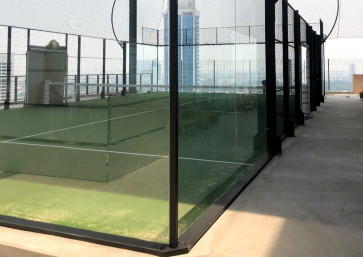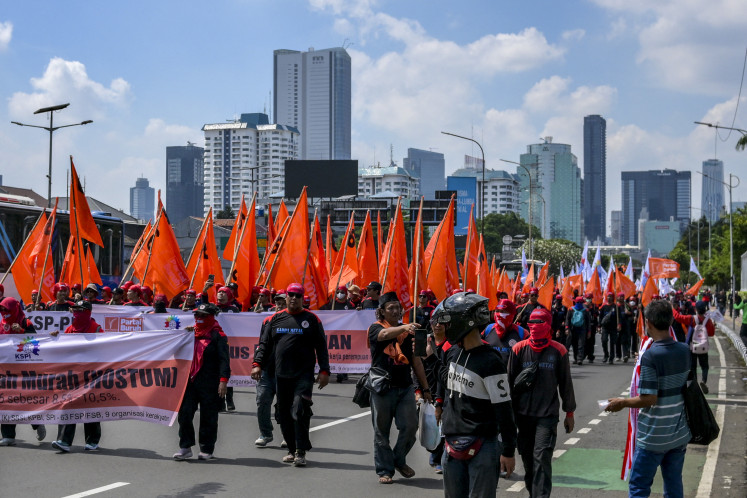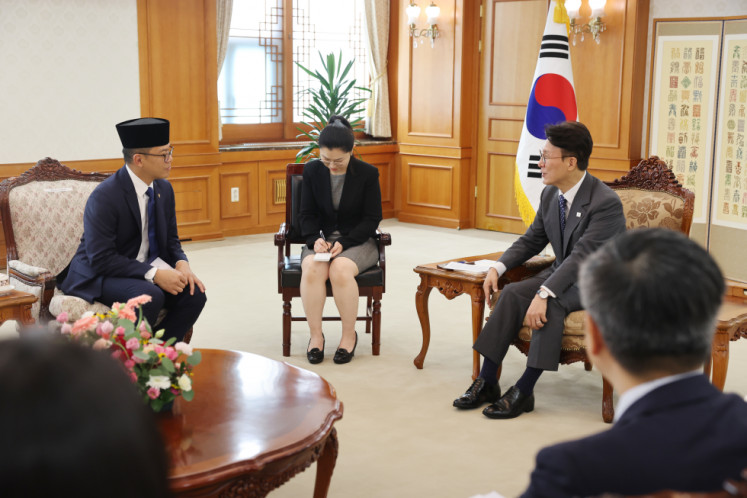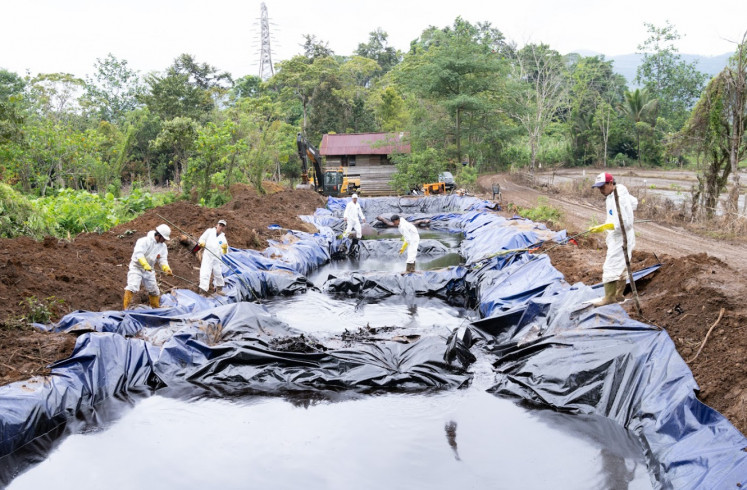Popular Reads
Top Results
Can't find what you're looking for?
View all search resultsPopular Reads
Top Results
Can't find what you're looking for?
View all search resultsFranki Raden: The time traveler
A leading Indonesian ethnomusicologist likens his archipelagic home to a time machine
Change text size
Gift Premium Articles
to Anyone
A
leading Indonesian ethnomusicologist likens his archipelagic home to a time machine.
Composer and ethnomusicologist, 58-year-old Franki Raden explains by criss crossing the nation he can experience every phase of human history through music and cultures that remain unchanged over millennia.
“The significance of being in this country of Indonesia is that I can experience the most modern and technical city of Jakarta or I can live in a traditional Hindu pre-Islamic place like Bali or I can go to the stone age of animism in Kalimantan or Papua where I can experience pre-history. Here you can see the whole spectrum of history, very much alive in your [local] environment.
JP/J.B. Djwan
“You can position yourself at any stage in time and human civilizations are still intact. This is Indonesia — how rich Indonesia is. I can see this and express myself through music. That’s why I formed the Indonesian National Orchestra,” says Raden ahead of the orchestra’s Australian tour in September this year.
Raden, who lived in the US for more than a decade and taught at National University of Singapore for a year, was not always aware of nation’s musical history or cultural diversity. He came crashing into its discovery during his student days at the Jakarta Institute of the Arts (IKJ) back in the 1970s.
“It was in the 1970s I was an undergraduate at IKJ majoring in modern composition. Then in 1976 out of the blue a friend asked if I wanted to go to the centre of Borneo to live with the Dayak. Without thinking we left school and went to live in the jungle for a year. It was like an instinctive decision and I found it became a religious experience for me — living with the Dayak,” says Raden who says ancient magic almost cost him his life on two occasions when he accidentally messed with a local shaman.
“I disturbed a Dayak shaman in the middle of the night in the middle of the jungle. We had gone to a neighboring village to do some music and dance practice — we were coming home dark in the jungle — so we were making a lot of noise because there are bears and it’s scary. We passed a house on the way back to our canoe. We got in and the canoe seemed to be pulled down into the water from the front. It felt like someone was pulling it under. I jumped out and started swimming and I am not a good swimmer — especially in the river in the dark in the jungle.
“I started to sink and felt what happened when you die — like a movie frame by frame my loved ones flashed past my eyes, my wife, my family. The a few seconds later my feet touched the ground and I realized I was near the river bank. All my energy came back and I started laughing like crazy. That was my first religious experience,” says Raden who next day headed back to the river in hopes of finding his camera and sound equipment, all dumped into the river.
“There was a man about 20 meters away watching us on the riverbank. I opened conversation but he didn’t look at me — I told him what had happened the previous night. ‘Yes that happened because you disturbed me when I was talking with my white crocodile’, he said. I slipped away from that gentleman. He was the shaman who had tried to sink our boat,” says Raden, still awed at the unknown and unknowable powers still active in Indonesia.
And it is this magic, this esoteric knowledge that transformed Raden’s perception of music more than 40 years ago.
“When studying at IKJ I focused on the Western music system. I was shaping my career as a Western artist. I felt then Western music was the only real music — other music was a craft — folk music and we did not consider it as an art form — that was the ideology. Living with the Dayak I realized the music is deeply embedded in the cultural fabric. In Jakarta there is life and art, two separate things, but I saw in the Dayak there is no separation — everything is integrated into one entire cultural fabric.
“Good farmers are also good dancers, good painters, good actors, singers and musicians — they do it all at the same level with the same passion. When I came back from the jungle I had changed everything, my view of art, social awareness everything, that’s why I see that period of my life as a religious experience,” says Raden adding that so powerful was his period in the jungles of Kalimantan that even now the memory of his journey is fresh and rich and vibrant. “The experience was so strong I feel it happened yesterday.”
Discovering the depth of traditional music making forced Raden to rethink his studies.
“When I was in New York I decided to study ethnomusicology – it was a new field then and I wanted to broaden and deepen my knowledge. My PhD was focused on Indonesia. The problem with this field it is strictly academic — so it does not fit our cultural context because what is called ethnomusicology is still very much alive — still contemporary, so it can’t just be studied as a research,” says Raden who applied his ethnomusicology and composition skills to create another approach to traditional music making.
It is this that led to the formation of the National Indonesian Orchestra that draws together musicians and their 45 traditional musical instruments from across the archipelago.
“The orchestra is based on ancient musical roots that have continued to evolve and grow; this is not an artifact, not a museum, but [music] that is very much alive,” says Raden, pointing out that Indonesia’s musical traditions paint a history of its people.
“Indonesian music is thriving and can be seen across the strata of time and music making. Each part of music represents another layer of civilization.”
To raise understanding of this extraordinary legacy of music, Raden is working towards the 2011 Indonesian Musical Expo in Nusa Dua in November, an international symposium for ethnomusicologists supported by the ministry of trade.










